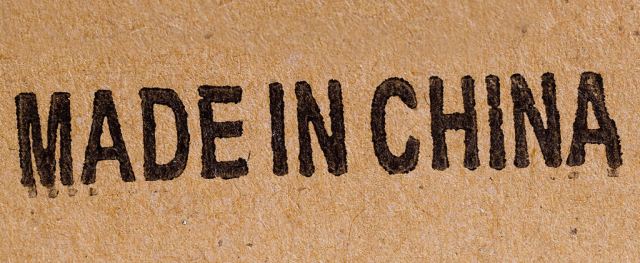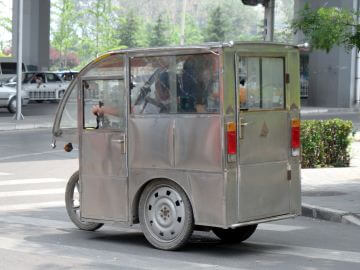
There seems to be a lot of outdated advice on the web, mostly about not putting chopsticks in rice, so here are a few tips you may not see in the guide book.
Before You Leave
- If you enjoy your food, practice with chopsticks long before you arrive. You probably already know how to use them, but food here is often a lot larger and heavier than at home, so hands can get tired quickly. It’s got to the point where I can eat a full-size corn-on-the-cob with just chopsticks.
- Bring both anti-diarrhea tablets
and anti-constipation tablets
along with some anti-acid tablets
. Everything else is available here.
- Most hotels have wifi. Many have internet terminals, but they’re often antiquated – IE6 is still prevalent, so avoid doing anything secure.
- If you want to use online banking or Facebook and Twitter, invest in a cheap, portable VPN.
- Get travel insurance – healthcare is expensive in China if you don’t want to be stuck in a cheap Chinese hospital where no one speaks English.
- China uses 220v two pin plugs, and sockets accept both the round and flat varieties. Hotels often have limited sockets, so bring a travel plug adapter
then pick up a cheap multiplier in a supermarket – some accept US & UK plugs. - Don’t try to see too much in a short time – distances in China are huge so you’ll spend all your time in airports or on trains.
- Make yourself aware of some common scams in China, particularly those relating to taxis, before you get taken for a ride on the way to your hotel.
- Print out your hotel name and address in Chinese, for the taxi driver.
When you arrive
- Despite its size, China only spans one time zone: GMT +7/8 depending on daylight saving time. Check your timezone here.
- Carry toilet paper or a packet of tissues everywhere. If you see a clean toilet, use it.
- You are supposed to carry your passport at all times, but don’t bother. I just keep a photo on my phone and have never been asked to see it in 5 years. You only need the real passport when checking into hotels.
- Try to avoid photographing government and military buildings. These are usually unmarked, but will have a heavier police presence in the area, both uniformed and undercover.
- Foreigners get stared at and commented upon. If you have dark skin, don’t get offended if people repeatedly say “ni-ga”. It’s actually na-ge, meaning “that one”, and is a filler word equivalent to saying “um” or “er”. If they say Hagwei/Hayquay feel free to get offended.
- Learn some simple Chinese phrases.
- Ask the hotel for a business card, so you can give a driver the accurate address in Chinese. The hotel may also supply subway maps in English.
Getting About
- Taxis drive in a scary fashion, but are safer than they look. Pedicabs are just as dangerous as they look.
- Be particularly careful at zebra crossings – cars are allowed to turn right at red lights, and other cars frequently ‘forget’ to stop. Silent electric bikes often travel the wrong way on the road and pavement. Cross the road with crowds as padding.
- Prepare to be pushed and shoved in queues.
- People are friendly and may want to chat, but don’t follow them anywhere – read up on the teahouse scam and the art student scam.
- Don’t travel in early October. It’s the national holiday week, so the entire country is on the move. Similarly check the Spring Festival dates, as it’s best to avoid travel during Chun Yun.
Food and Eating
- Try everything, but don’t feel you have to eat the unusual foods. The Chinese won’t be offended and expect foreigners to have weak stomachs.
- Table manners are very different. Some guides will still tell you that burping, slurping and spitting are encouraged, but the modern urban generation now frown on it as ‘acting like a farmer’.
- Same for not leaving your chopsticks upright in rice. Nobody cares that it looks like the offerings at a funeral, it’s just uncouth in the same way you wouldn’t leave your fork stuck upright in mashed potato. Unless you do.
Money, Tips and Shopping
- Assuming you arrive in a major city, there are ATMs everywhere and credit cards are widely accepted. Far less so in the countryside. At ATMs, check on the machine for a Visa/MC logo. These machines will accept overseas cards and have an English option. Bank of China also accepts Maestro. Amex is rarer.
- After entering your Pin, select Overseas, then Savings (it’s the only option that seems to work with overseas cards). If the Pin requires six digits and you only have four, add ’00’ to the beginning.
- When paying by card you’ll be asked for a PIN number, then still required to sign the receipt.
- Check the bill. It’s not considered rude, as mistakes are rife.
- There’s no need to tip taxis or restaurants.
- Your phone from home is unlikely to work, but local SIM cards are very cheap. China Unicom is the only provider with 3G pay-as-you-go (PAYG).
- Haggle in markets. Don’t haggle in shops.
- Don’t come expecting bargains – a 50-100% luxury tax is in place for high-end imported brands, even if they were made in China!
If you’re coming to Beijing to work, then forums like Expat Blog are invaluable for meeting other expats, finding jobs and housing. Try getting a place to live as close as possible to work, as commuting in Beijing is particularly slow.
I’ll update this occasionally, so please add any extra tips or corrections you may have in the comments below.
10 minutes and you know about China
A well made video, but turn the volume down as it’s noisy at first. (Youku mirror):








Pingback: (@BlogExpat) (@BlogExpat)
Pingback: Hao Hao Report
Pingback: maryanne oxendale (@koangirl)
Steve,
With a little over a month to go before I travel to Hong Kong and China I found this post incredibly helpful. I’ve already made a list of things that I still need to check out and sort out but you just about crossed some 10 points of my list with this simple post. I think I’ll just print this of for reference! Simple advice and really helpful, thanks for sharing this, e.g. if I hadn’t known that PIN bit for the ATM I would have probably stood there like a fool not knowing what to do with myself. My bank here in Ireland seems to have no problem organising HK$ for me but apparently Chinese Renminbi they do not do. I must check if this is the case for all Irish banks, though I sincerely hope that the Bank of Ireland would be able to sort me out, if they can’t I will be very surprised and someone disppointed also. Nevertheless, it should be okay for me to travel with some HK$ and then exchange Chinese Renminbi while in HK, at least that’s what the bank advised. Though on the other hand they also advised that I should just not exchange HK$ over here and simply take it off my account upon arrival in HK but travelling with absolutely no cash seems just a little crazy to me…
The last time I travelled to HK I found that exchange rates were a lot better in Mainland China (I think they incorporate less commission and it makes a big difference if you’re exchanging a signficant amount) so you might want to wait till you get to Mainland China to get your RMB.
It’s not great arriving somewhere with no cash – I’m pretty sure I’ve got rmb at the UK airport Travelex, with reasonable exchange rates. Otherwise, get a little in HK and the rest on the mainland, as Mira suggests.
Pingback: (@Selly06) (@Selly06)
Don’t haggle in shops? Actually, you can haggle in a lot of shops. Some will say no but many are willing to bargain. Apart from that the rest its pretty much spot on. I’d probably add to bring deodorant if you’re going to smaller cities.
Fair point on the shops – I was trying to counter the guide book advice which was to haggle *everything*.
I forgot to mention the deodorant! I find it easy enough to get antiperspirant in cities, but the deodorant component is usually lacking.
I think it’s worth mentioning that these days lots of people know some basic english phrases.
They are exposed to Western music, movies, etc and have included a lot of English in their own media… even less-educated people might be able to understand or speak these sorts of phrases.
Hello, Nice to meet you, Welcome to China, Sit down Please, Good morning teacher, Come on Baby, F$%^k you!, Thank you, Bye Bye, Numbers to 5, I love you. Go Home, Let’s go. Are you ready? Happy everyday! Cheers. Sorry! Excuse me. My name is … I am …
If you know what they might be trying to say through the poor accents, it’s easier 🙂
But pay attention for a few misunderstandings!
“I love you” sometimes they’re just trying to say “I like you”
If an English speaker likes to spatter his sentences with liberal usage of the F-word, let’s say, for emphasis (“It’s really f-ing hot”) remember that they only think of the F-word in the “insulting” tone and may take offense.
Best fight I ever saw in China went like this:
2 tables drinking at late night BBQ, one group of Chinese, one group of Westerners.
Chinese table sees Westerners and start the typical conversation amongst themselves.
“Hey look, foreigners” “wow” “can you speak any english” “sure, I can say “hello” and “F@#$K you!”
Western table is checking out the girls at Chinese table and overhear the “English”. Take offense. Big Scary German tries to bash some shirtless scrawny Cantonese guy with a chair, German ends up popping his wife in the face instead.
Hilarity Ensues.
Hope this helps & Welcome to China 🙂
All good points – the level of English has improved dramatically since I first visited in 2006.
I think I was happily blissfully ignorant of some of the comments made about me by people at the next table before I learnt some Mandarin.
Hmm, trying to reply to your comment, but can’t see either your comment or mine on the site!
Anyway, you’re right, you can’t haggle everywhere. My wife’s Chinese though and she’ll haggle in most cases.
Deodorant is always one of the first things I pack, because of years sweating on deodorant being sent by relatives at home! But the last couple of years I was in China (been back in Australia for 3 years now) I had no trouble finding it in a 2nd tier city close to Beijing.
Pingback: (@acceleratedstal) (@acceleratedstal)
Steve, I just found your site a few days ago, but have been finding it immensely useful and amusing to boot! My husband and I are currently planning an extended, RTW trip and we want to spend about 2 months in China, so these tips will stand us in good stead, I think.
The one thing I was wondering about regarding money is the Chequing/Savings balance. We were assuming that we should keep most of our money in Savings, and just move bits over to Chequing every now and then so that on the off-chance our card got hacked, the person wouldn’t have access to all of our funds. Is it the opposite in China? Would we be accessing our Savings account through the ATMS, not Chequing? I should note that we are not intending to use our credit card (a Visa) to take out money, but our debit card from our bank.
Hi,
It’s just confusing labelling on the English menus – money withdrawn from the Savings option comes out of my Current account, and I’ve not found an option to get into my actual Savings account from the debit card (even though they assure me this is possible), so I just move money between the two via online banking.
When you reach Beijing, this may come in handy – a guest post on Beijing I did for yTravel blog – Have a great trip!
Ah, excellent! Thanks for the clarification. I suppose I shouldn’t be surprised that the English would be a bit misleading in China!
Also, that link to yTravel is how I found your site in the first place! It was really helpful, and while I think that with China, you just kind of have to take the plunge and get your feet wet, I’m happy to have read all your tips (especially about Peking duck!).
Pingback: East Asia Blog Round-Up : 29/4/2012 | Eye on East Asia
These are great tips! I personally found travelling in China a little more challenging than other countries in Asia given the language barrier and lack of romanized characters at times but it sure provided for interesting and quirky moments!
The language barrier gets almost exponentially worse the further west you travel, but in lack of pinyin and heavy accents.
You hit everything from A-Z. Nice post.
Thanks for these tips! Very thorough! We think we’re moving to China later this year, so this will really come in handy!
Hi Steve,
Congratulations on compiling a clear and practical list that cuts through all the bullshit. For the benefit of any women reading this I should add that tampons are extremely hard to get hold of (or so I’m told), and I’ve known a couple of people who’ve had to get them sent from home. Just a friendly heads up…
Cheers – Pads are available in Tier 1 cities, but tampons are very rare, so bringing/sending them from home is a good tip.
I found that for me (in 2011) it was not possible to withdraw more than 2000RMB at many ATMs, even though it said max was 2500. It just came out with an error, that didn’t make sense. Found out when my brother managed to pull 2000RMB many times and from same machines.
Anyway, just a heads up, if you experience same problem.
Many ATMs in China are limited to 2000rmb per transaction, but depending on your bank and withdrawal limit you should be able to keep sticking your card in and get more. A good idea to check with your bank before you depart.
Nice post. I always hate ordering in restaurants always end up with something i did not want. Its always best to find a local and tag along.
Definitely a good idea, and you’re more likely to know what you’re eating.
Sometimes everyone is confused though – for lunch yesterday the menu had “Grandmother’s Pocket” (in both English and Chinese) as an option.
Pingback: @ACoupleTraveler
couple of less-known food tips:
#1 if you are worried about the food, or generally new, try eating a lot of raw garlic with your meals. Its great for killing bacteria and boosting your immune system. Especially useful when travelling around countryside or when eating street food. Must be raw though.
#2 if you find yourself with food poisoning or delhi belly, you can get your hands on sprite pretty much anywhere these days, and it keeps you hydrated much better than plain water.
#3 if mixed drinks or shooters are only in the 10-20 RMB range, and have a particularly virulent aftertaste or burning up your nose — they’re probably fake alcohol brewed with formaldehyde, so don’t go overboard. Not sure how much of an issue this is now, but it was pretty bad in wudaokou a couple of years ago
These are great tips. I recently learnt the garlic one – many small restaurants offer garlic free to customers.
Thx for sharing.Great
I planned to go China, but suspended by the coronavirus, so can only learn Chinese at home and took the live online lesson by communicating with native-Chinese teachers from eChineseLearning.com
It seems good currently. Do you think this method of learning is realistic?